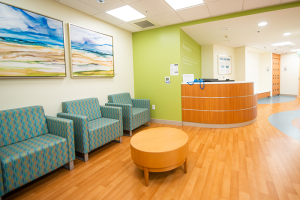Building a sustainable haven for behavioral health patients

FROM LEFT: Cory Pouliot, senior director of facilities at Boston Medical Center Health System; Bob Biggio, senior vice president and chief sustainability and real estate officer at Boston Medical Center Health System; Nancy Hanright, senior director of real estate and space planning at Boston Medical Center Health System; and Tony McLeish, facilities manager at Brockton Behavioral Health Center.
Image courtesy of Boston Medical Center
The COVID-19 pandemic wreaked havoc upon health care systems, taxing hospital resources nationwide and making millions sick. But it wasn’t just physical health that was impacted. The pandemic also created a behavioral health crisis in communities large and small.
2024 Excellence in Health Care Facility Management Award
Winning entry
- Project: Boston Medical Center Brockton Behavioral Health Center
- Location: Brockton, Mass.
- Start date: January 2021
- Completion date: November 2021
- Budget: $40 million (approximate)
Project team
- Bob Biggio, senior vice president/chief sustainability and real estate officer, Boston Medical Center Health System
- Nancy Hanright, senior director, real estate and space planning, Boston Medical Center Health System
- Tony McLeish, manager, facilities and support services, Brockton Behavioral Health Center
- Cory Pouliot, senior director, facilities operations, Boston Medical Center Health System
- Tracey Weeden, executive director, Brockton Behavioral Health Center
One area especially vulnerable was Brockton, Mass., and the greater Boston area, which had experienced the third-highest peak in the country among those waiting in emergency departments for inpatient behavioral health admissions. Boston Medical Center, the largest essential hospital in New England and part of the Boston Medical Center Health System (BMCHS), sprang into action and decided to build a new behavioral health facility designed to address the critical shortage of patient beds and the rising specter of behavioral health and substance use disorders in the state.
In October 2022, the new Brockton Behavioral Health Center opened, an environmentally sustainable, 64,000-square-foot facility that provides comprehensive treatment for a wide range of psychiatric conditions and medical needs. Built from a vacant nursing home, it features two secure units that can accommodate 82 inpatients, with 56 acute inpatient psychiatric beds for those aged 16 and older with behavioral health needs and 26 clinical stabilization services beds for patients aged 18 and older who require step-down treatment for substance use disorders following detox or inpatient care.
“The center represents a deep investment to expand access to essential mental health care. This new property provides a restorative environment for patients — one with beautiful spaces and plant-filled outdoor pathways that support interaction, healing and engagement,” says Tracey Weeden, executive director of Brockton Behavioral Health Center. “By taking a trauma-informed approach to care, the staff can meet each patient's unique, individual goals and psychiatric needs.”
Award-winning transformation
The first task was to gather a skilled team capable of achieving its formidable objectives. BMCHS recruited Isgenuity LLC, Boston, as the lead design firm; general contractor Southern Middlesex Industries, Norwood, Mass.; structural engineer Goldstein-Milano Structural Engineering, Reading, Mass.; civil engineer Tetra Tech, Mansfield, Mass.; and mechanical, electrical and plumbing engineer CMTA Inc., Framingham, Mass.
Their job was to transform a long-vacant 1960s-era nursing home into a state-of-the-art structure that was net-zero carbon emissions from day one — aligning with BMCHS’s goal to be carbon-neutral by 2030. The building underwent significant upgrades, including improvements to its envelope and heights, along with enhancements to its interior and exterior.
“The existing structure of the building was reused, including the floors, columns, bearing walls and foundations, in a deliberate goal of reducing the amount of materials sent to landfills,” says Bob Biggio, BMCHS’s senior vice president and chief sustainability and real estate officer. “By using the existing infrastructure, we saved around 1 million kilograms of carbon from landfills, which is the equivalent of keeping more than 200 cars off the road or the carbon-removing power of 17,000 10-year-old trees.”
The behavioral health care center utilizes cutting-edge geothermal heating and on-site solar energy production. These innovative measures help BMCHS reduce carbon emissions, lower pollution and improve air quality, creating a green and welcoming environment for patients, staff and visitors.
These are among the remarkable accomplishments that helped BMCHS and its team claim the American Society for Health Care Engineering’s (ASHE’s) 2024 Excellence in Health Care Facility Management Award, which recognizes individuals or facilities management departments that implement new or innovative programs or processes to optimize the physical environment and improve patient care.
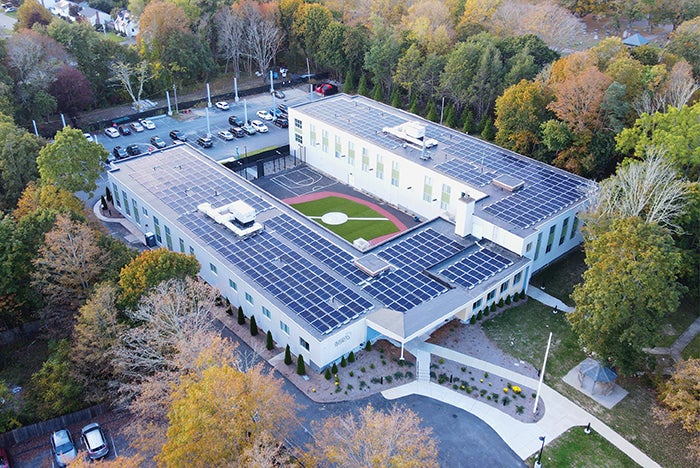
Brockton Behavioral Health Center features access to an outdoor courtyard, including walking paths, sheltered areas, and exercise spaces, creating ample opportunities for socialization and physical activities.
Image courtesy of Boston Medical Center
“Brockton Behavioral Health Center was chosen as the winner of this year’s award based on many factors, including its emphasis on mental health, sustainability and unique design components,” says Robert L. Baird, CHFM, CHC, CHSP, FASHE, director of facility operations at University of Florida Health in Gainesville, Fla., and a member of the ASHE awards and recognition task force that selected the award recipient. “All the award candidates had worthy goals and outcomes, but Boston Medical Center stood out for meeting its objectives from the design phase and providing a sustainable facility for an underserved population. This focus will serve its community well for decades to come.”
Sustainable features
Brockton Behavioral Health Center is a green marvel: a net-zero energy-ready facility that utilizes many innovative technologies. These include geothermal wells, ground source heat pumps and on-site solar energy production and storage.
“The design team surgically inserted an innovative 100% electrified geothermal heating, ventilating and air-conditioning system, with dedicated outside air systems, consisting of 88 wells and 14 miles of underground piping reaching 500 feet deep,” explains Nancy Hanright, senior director of real estate and space planning at BMCHS. “Due to the tight site constraints, the geothermal wells were placed near the building footprint and under the outdoor recreational space.”
Because of the low floor-to-floor height, critical coordination between the design and construction teams was required to ensure the accessibility and maintainability of systems, including a fresh air system that supports health and wellness for both staff and patients.
“Our intentional focus on incorporating resilient design allowed us the ability to respond to unexpected events quickly with minimal disruption,” says Hanright.
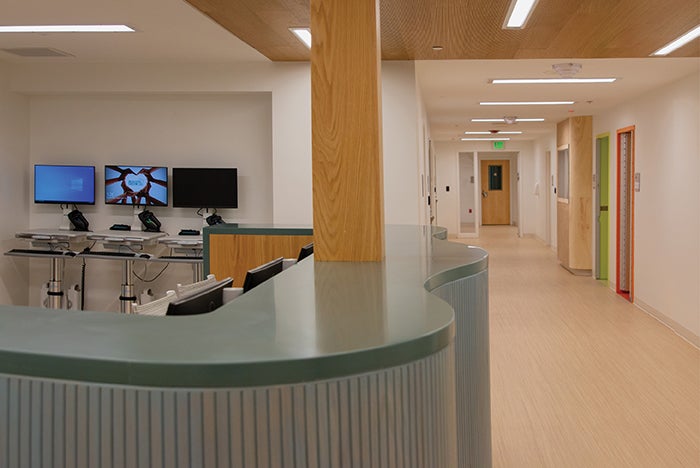
Brockton Behavioral Health Center features three secure units, treating patients across the full spectrum of psychiatric conditions and medical needs, including co-occurring mental health and substance use disorders.
Image courtesy of Boston Medical Center
Other sustainable features include all-LED lighting, an enhanced building envelope, an airtight insulation system that extends 2 feet below the foundation, fully electric kitchen and laundry facilities, renewable energy sources and energy storage systems. These components collectively ensure the behavioral health care center’s long-term sustainability. Additionally, a 750-kilowatt (kW) photovoltaic system and a 500-kW energy storage system will soon be installed to offset the building’s energy consumption, further alleviate grid congestion and reduce carbon emissions.
Each month, the BMCHS team evaluates the building's energy consumption and system performance using the energy use intensity (EUI) metric. Since its debut, the facility has achieved an EUI of 49 thousand British thermal units per square foot (kBtu/sf), surpassing the initial design estimate of 51 kBtu/sf.
In fact, the behavioral health care center is just one of the many ambitious projects that BMCHS has undertaken to advance its climate initiatives. Across the system, sustainability efforts to date have reduced systemwide utility bills by more than $8 million per year. An estimated $150 million in projected savings over the next 20 years thanks to its pioneering energy efficiency programs and reduced consumption will allow BMCHS to reallocate that money toward helping its patients.
“That’s the equivalent of $3 billion of care that we will provide to the communities we serve,” says Hanright. “I look at the work we’ve done and the savings we’ve generated as helping the facility pay for itself. This is an example of how hard work has enabled us to afford to do something like this — increasing access and further assisting the community we’re dedicated to caring for.”
Consider that the Biden administration’s Justice40 Initiative and Climate and Economic Justice Screening Tool have classified Brockton, with a multi-ethnic population of about 106,000, as a disadvantaged community. BMCHS identified how climate change disproportionately affects the marginalized people and communities of color it serves, providing further impetus to create the new behavioral health care center.
“BMCHS worked to find innovative ways to create a sustainable facility while also prioritizing operational excellence,” Hanright says.
Beneficial amenities
The design team implemented many subtle features that make a significant difference in the patient experience. Examples include a discrete ambulance drop-off area and a direct access path within the building, allowing incoming patients to reach patient floors without passing through public areas. Additionally, the entry vestibule to the unit was designed for a concierge experience with a check-in desk and direct access to consultation rooms and intake areas — all before setting foot in the locked psychiatric unit.
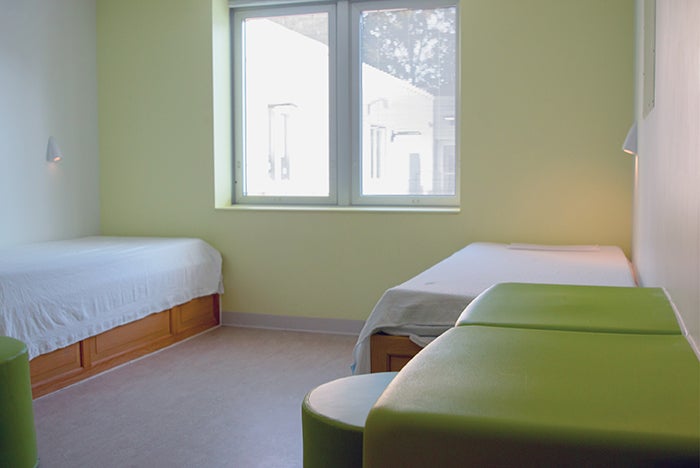
Boston Medical Center prioritizes use of materials that comply with the AIA Healthy Material Pledge throughout the Brockton Behavioral Health Center, offering vetted yet sustainable alternatives to hospital standards.
Image courtesy of Boston Medical Center
The behavioral health care center was thoughtfully designed to enhance the health and well-being of all occupants by also incorporating elements inspired by nature. These natural materials and spaces were carefully integrated to create a harmonious and soothing environment. Prioritizing materials that adhere to the American Institute of Architects’ Healthy Materials Pledge, the design offers sustainable and vetted alternatives to typical hospital standards.
Common areas feature safely integrated plant-filled terrariums, bringing a touch of nature indoors. Outside, the courtyard is landscaped with native foliage and includes meditative walking paths, sheltered areas and exercise zones that provide restorative spaces for human interaction and ample opportunities for physical activities, benefiting patients, caregivers and visitors alike. The facility’s blue and pale-yellow exterior and curvilinear architecture combine to offer a supportive and calming atmosphere as well.
“While developing the project, our teams referenced research showing that biophilic elements, access to natural light and warm color palettes reduce patient anxiety and stress,” says Hanright.
Another distinguishing feature of the behavioral health care center is its dedication to fostering a workforce with multicultural competence. Collaborating with community partners, the facility has engaged with diverse communities to expand its behavioral health workforce.
At Brockton Behavioral Health Center, 65% of employees hail from nearby communities, and more than 55% identify as people of color. The staff is multilingual, offering culturally competent care in up to 150 languages, thereby removing barriers to critically needed communication and care. The team also includes members of the LGBTQ+ community, further enhancing social cohesion and resilience and benefiting patient outcomes.
Weeden notes that referrals to the behavioral health care center, which doesn’t accept walk-ins, will be made exclusively by other health care providers. Upon discharge, patients will have a coordinated care plan in place, which includes transportation from the facility.
Operations and outcomes
“Brockton Behavioral Health Center is modeling how operational excellence can drive health care outcomes both for current patients and our communities,” says Hanright. “By investing in sustainable and green design, we can reduce the overall environmental impacts of health care.
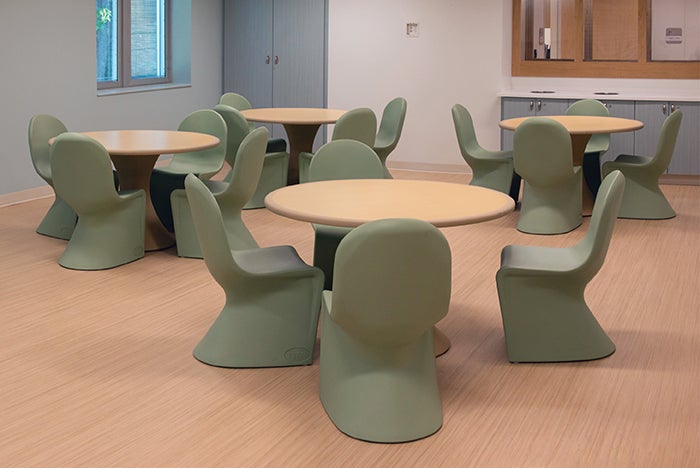
During the design process, access to natural light and warm color palettes were incorporated into Brockton Behavioral Health Center to reduce patient anxiety and stress.
Image courtesy of Boston Medical Center
“Our efforts prove that it’s possible for hospitals and health care networks to achieve sustainability and climate goals and commitments,” Hanright continues. “Listening to diverse voices inside and outside our walls has provided us with insights and information to make this center a reality. Best of all, this model is replicable and can be used as a guide for other medical centers and systems.”
Scott Wytosick, a Life Safety Code® and fire safety consultant with Jensen Hughes, Independence, Ohio, and a member of the ASHE awards and recognition task force, says BMCHS thoroughly impressed him and the other judges.
“Many candidates for this award sent in applications detailing ways they saved money. But this award traditionally focuses specifically on project results and effects on patient care,” notes Wytosick, who adds that Brockton Behavioral Health Center has received other awards. “Boston Medical Center caught my attention for achieving two different project objectives: its geothermal and solar energy investment in a retired nursing home facility, as well as the incorporation of outdoor patient access. The task force appreciated how this applicant demonstrated a nature-inspired focus on behavioral health and emphasized reducing year-over-year energy costs by reusing a former 1960s-built nursing home.”
In fact, BMCHS is modeling a new kind of excellence where high-quality care supports climate and sustainability goals, Weeden maintains. “This premier facility provides a renewing, eco-friendly, comfortable and safe place for our patients to receive expert care,” she says.
RELATED ARTICLE: Team overcomes project hurdles
Boston Medical Center Health System (BMCHS) overcame several significant obstacles in its path to building the green, forward-thinking Brockton Behavioral Health Center in Brockton, Mass. For example, due to a critical shortage of treatment beds in the community, the project was expedited to meet a demanding 19-month timeline. “Also, because we were constructing on the heels of the COVID-19 outbreak, we had to deal with serious supply chain issues,” says Cory Pouliot, BMCHS’s senior director of operations. “Receiving the equipment and resources necessary required us to become creative and sometimes drive to the manufacturing plants ourselves to save time on delivery.”
Another hurdle was convincing initially skeptical decision-makers about the benefits of the net-zero design and the implementation of renewable energy systems and geothermal wells. “In the project’s early stages, stakeholders were concerned about the feasibility of achieving a net-zero design within budget as well as the potential community disruption during construction,” says Bob Biggio, BMCHS’s senior vice president and chief sustainability and real estate officer. “However, the design team demonstrated that integrating geothermal wells would not only lower energy costs but also yield a higher return on investment compared to traditional heating and cooling systems, all while creating a healthier environment for patients and staff.
“By strategically cost-shifting, right-sizing heating, ventilating and air-conditioning equipment and utilizing data-driven design, the team successfully achieved the project’s sustainability goals while staying within budget and completing the project on time,” Biggio continues.
Adaptively reusing a former nursing home site presented significant challenges, including updating an obsolete building and integrating a modern central mechanical system into a structure not originally built for modern technology. The team overcame numerous impediments, including placing ductwork across shallow floor-to-ceiling heights and adhering to codes and standards.
“Fortunately, the primary structure was composed of masonry-bearing walls and steel bar joists,” says Nancy Hanright, senior director of real estate and space planning for BMCHS. “The original structure was entirely reused, and new openings in interior bearing walls were minimized to avoid schedule and structural impacts.”
Erik J. Martin is a freelance writer based in Oak Lawn, Ill.


